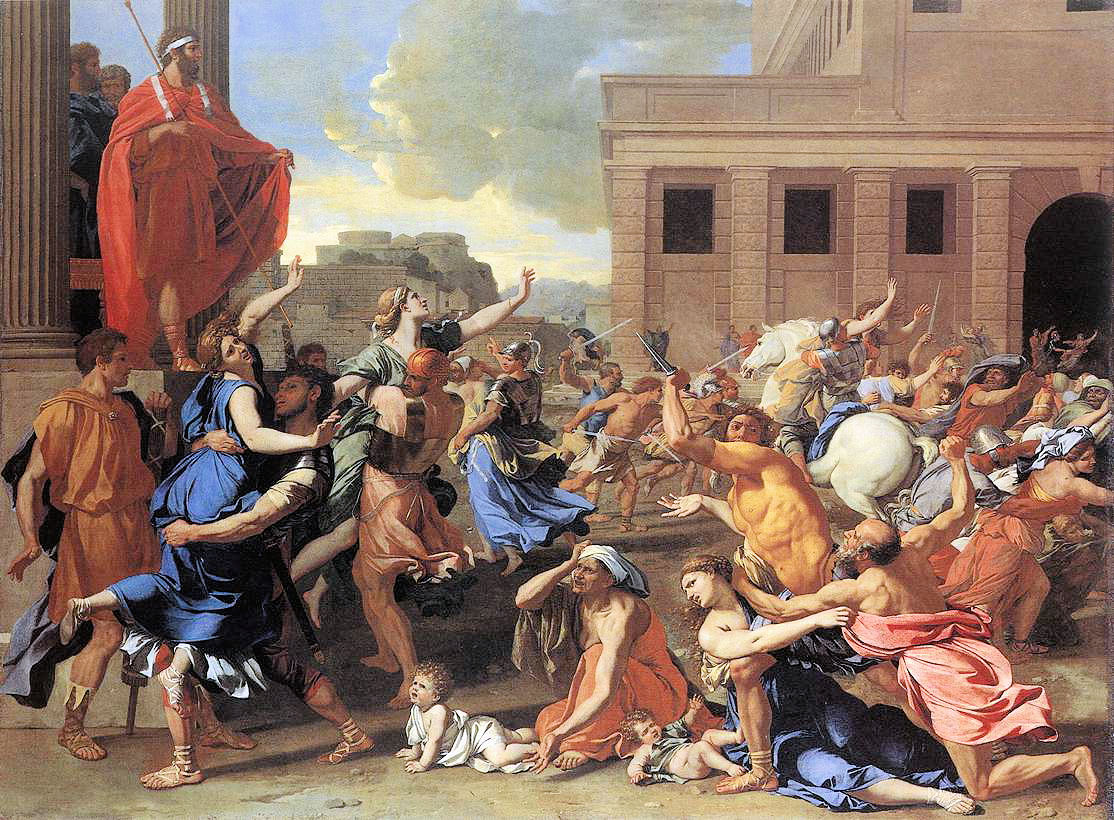Traditional founding of Rome: April 21, 753 BCE
This passage from Ennius is preserved in Cicero’s De Divinatione 1.48
“They were struggling over whether the city would be called Roma or Remora.
And worry about which one of them would rule infected all men.
They were awaiting the word as when the consul wishes to give the signal
And all men eagerly look to the wall’s border to see
How soon he will send out the chariots from the painted mouths—
This is the way the people were watching and holding their mouths
For which man the victory would elevate to a great kingdom.
Meanwhile, the white sun receded into the darkness of night.
When suddenly a white light struck the sky with its rays.
At the same time there came flying straight down the most beautiful
Bird from the left and then the golden sun rose.
Three times, four sacred forms of birds descended from the sky
And settled themselves in propitious and noble positions.
In this, Romulus recognized that the first place was granted to him,
A kingdom and place made certain by the signs of birds.”
Certabant urbem Romam Remoramne vocarent.
Omnibus cura viris uter esset induperator.
Expectant vel uti, consul cum mittere signum
Volt, omnes avidi spectant ad carceris oras,
Quam mox emittat pictis e faucibus currus:
Sic expectabat populus atque ora tenebat
Rebus, utri magni victoria sit data regni.
Interea sol albus recessit in infera noctis.
Exin candida se radiis dedit icta foras lux.
Et simul ex alto longe pulcherruma praepes
Laeva volavit avis: simul aureus exoritur sol.
Cedunt de caelo ter quattor corpora sancta
Avium, praepetibus sese pulchrisque locis dant.
Conspicit inde sibi data Romulus esse priora,
Auspicio regni stabilita scamna locumque.
Festus, Sextus Pompeius, On the Meaning of Words, p. 266 M. (= p. 326, 35 L.)
“Alcimus says that Romulus was the son born to Tyrrhenia and Aeneas and that Alba was Aeneas’ granddaughter from her, whose son, named Rhodius, founded the city of Rome.”
Alcimus ait, Tyrrhenia Aeneae natum filium Romulum fuisse, atque eo ortam Albam Aeneae neptem, cuius filius nomine Rhodius condiderit urbem Romam.
Servius Danielis, Aeneid, 1, 373
“The Annals were gathered in this way: the pontifex had a whitened tablet for each year on which he kept written the names of the consul and the rest of the magistrates and below which he typically kept notes of anything worthy of remembering which happened at home or abroad and at sea or on land on a daily basis. Ancient authorities edited the annual records kept with this care and they named them after the pontifices who assembled them, the Annales Maximi.”
ita autem annales conficiebantur: tabulam dealbatam quotannis pontifex maximus habuit, in qua praescriptis consulum nominibus et aliorum magistratuum digna memoratu notare consueverat domi militiaeque terra marique gesta per singulos dies. cuius diligentiae annuos commentarios in octoginta libros veteres rettulerunt eosque a pontificibus maximis, a quibus fiebant, Annales Maximos appellarunt.
Aulus Gellius, Attic Nights 11 .14
The most noble and chaste response of King Romulus on the use of wine
Lucius Piso Frugi displays the simplest elegance of phrase and style in the first book of his Annales when he writes concerning the lifestyle and diet of King Romulus. These are the words who he has written: “They say that when Romulus was invited to dinner he didn’t drink much because he had business the next day. His fellow dinners remarked, “Romulus, if all men acted like you, wine would be cheaper.” And Romulus replied, “No, it would be more dear: if each man drank as he much as he desired: for I drank what I wanted.”
Sobria et pulcherrima Romuli regis responsio circa vini usum.
1 Simplicissima suavitate et rei et orationis L. Piso Frugi usus est in primo annali, cum de Romuli regis vita atque victu scriberet. 2 Ea verba, quae scripsit, haec sunt: “Eundem Romulum dicunt ad cenam vocatum ibi non multum bibisse, quia postridie negotium haberet. Ei dicunt: “Romule, si istuc omnes homines faciant, vinum vilius sit”. His respondit: “immo vero carum, si, quantum quisque volet, bibat; nam ego bibi quantum volui”.
Plutarch, Theseus and Romulus 2
“A ruler’s first duty is to save the state itself. This is saved no less in refraining from what is not fitting than from pursuing what is fitting. But the one who shirks or overreaches is no longer a king or a ruler, but in fact becomes a demagogue or a despot. He fills the subjects with hatred and contempt. While the first problem seems to come from being too lenient or a concern for humanity, the second comes from self-regard and harshness.”
δεῖ γὰρ τὸν ἄρχοντα σώζειν πρῶτον αὐτὴν τὴν ἀρχήν· σώζεται δ᾿ οὐχ ἧττον ἀπεχομένη τοῦ μὴ προσήκοντος ἢ περιεχομένη τοῦ προσήκοντος. ὁ δ᾿ ἐνδιδοὺς ἢ ἐπιτείνων οὐ μένει βασιλεὺς οὐδὲ ἄρχων, ἀλλ᾿ ἢ δημαγωγὸς ἢ δεσπότης γιγνόμενος, ἐμποιεῖ τὸ μισεῖν ἢ καταφρονεῖν τοῖς ἀρχομένοις. οὐ μὴν ἀλλ᾿ ἐκεῖνο μὲν ἐπιεικείας δοκεῖ καὶ φιλανθρωπίας εἶναι, τοῦτο δὲ φιλαυτίας ἁμάρτημα καὶ χαλεπότητος.








